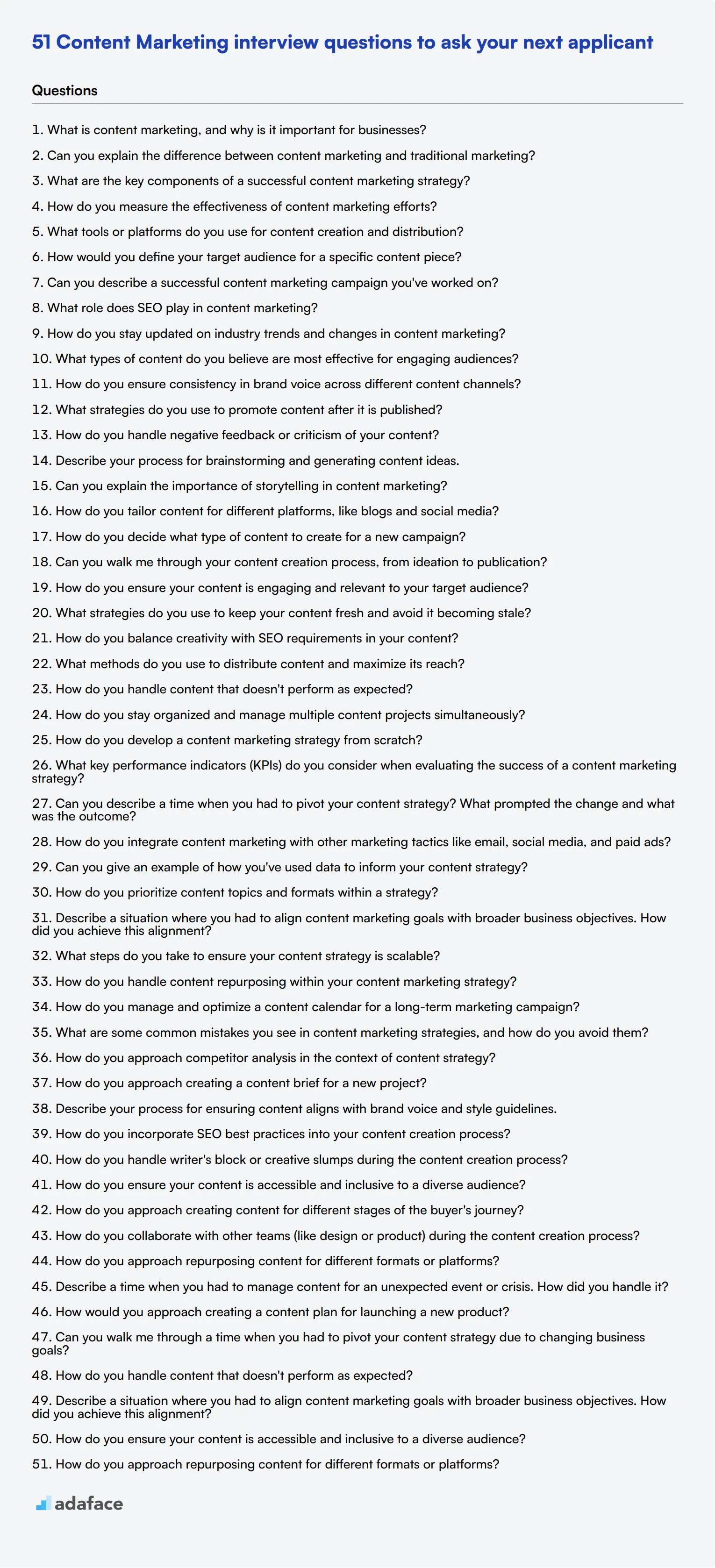In the ever-evolving field of Content Marketing, assessing candidates' skills and knowledge accurately is critical. Recruiting the right talent can significantly impact your marketing strategies and overall business growth, as highlighted in the necessary skills for digital marketers.
This blog post provides you with a comprehensive list of Content Marketing interview questions tailored for various experience levels and specializations. These questions are segmented into different categories to help you evaluate foundational knowledge, strategic mindset, and practical skills efficiently during the interview process.
Using these pre-defined questions will streamline your hiring process and enable you to identify top talent swiftly. Complement these questions with Adaface’s Content Strategy Test to further ensure you select the best candidates before the interviews.
Table of contents
16 basic Content Marketing interview questions and answers to assess candidates
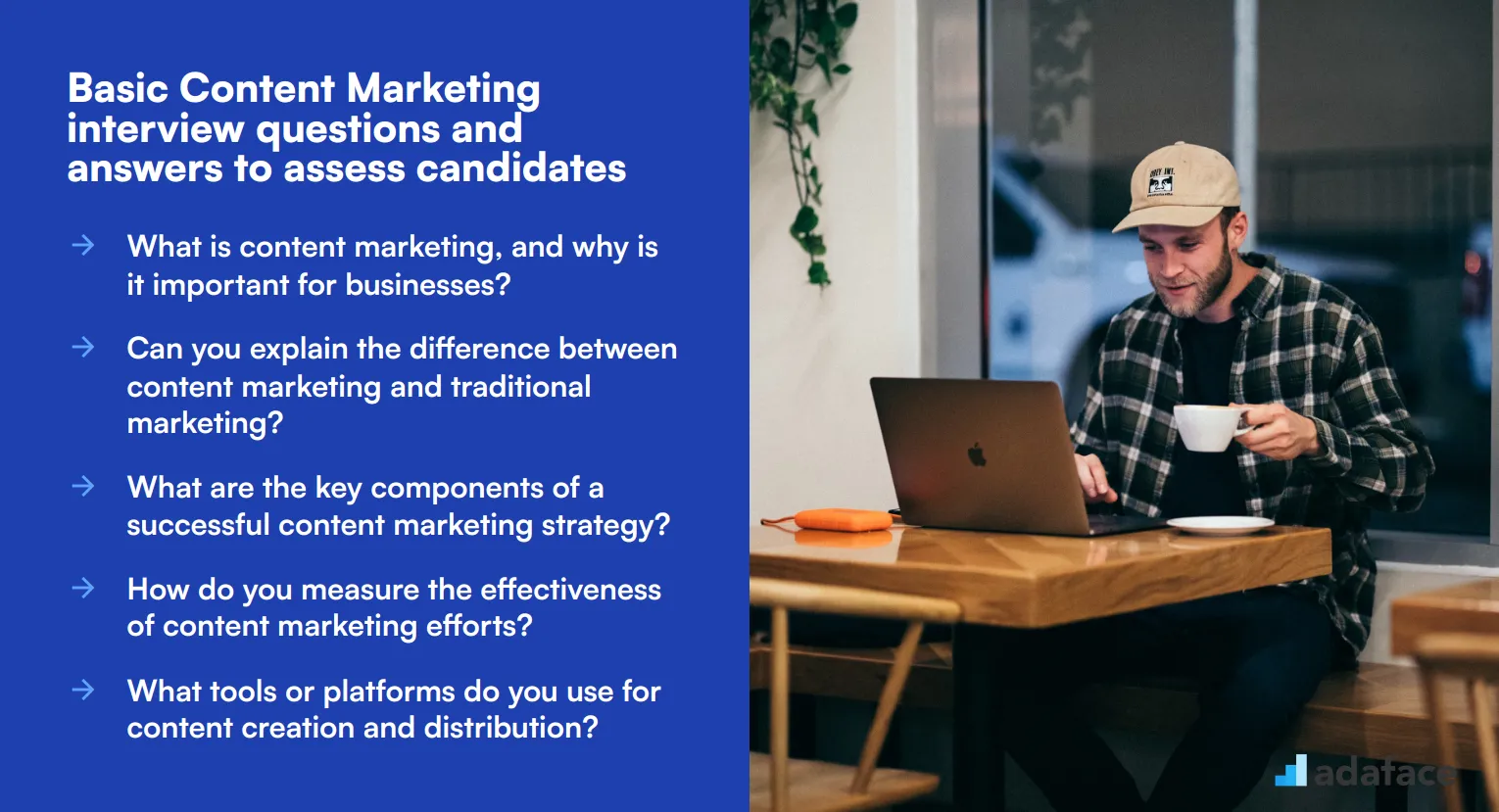
To effectively evaluate candidates' foundational knowledge in content marketing, consider using this list of essential questions. These queries will help you gauge their understanding and ability to implement content strategies, ensuring they align with your company's goals. For more insights on hiring, check out this content manager job description.
- What is content marketing, and why is it important for businesses?
- Can you explain the difference between content marketing and traditional marketing?
- What are the key components of a successful content marketing strategy?
- How do you measure the effectiveness of content marketing efforts?
- What tools or platforms do you use for content creation and distribution?
- How would you define your target audience for a specific content piece?
- Can you describe a successful content marketing campaign you've worked on?
- What role does SEO play in content marketing?
- How do you stay updated on industry trends and changes in content marketing?
- What types of content do you believe are most effective for engaging audiences?
- How do you ensure consistency in brand voice across different content channels?
- What strategies do you use to promote content after it is published?
- How do you handle negative feedback or criticism of your content?
- Describe your process for brainstorming and generating content ideas.
- Can you explain the importance of storytelling in content marketing?
- How do you tailor content for different platforms, like blogs and social media?
8 Content Marketing interview questions and answers to evaluate junior marketers
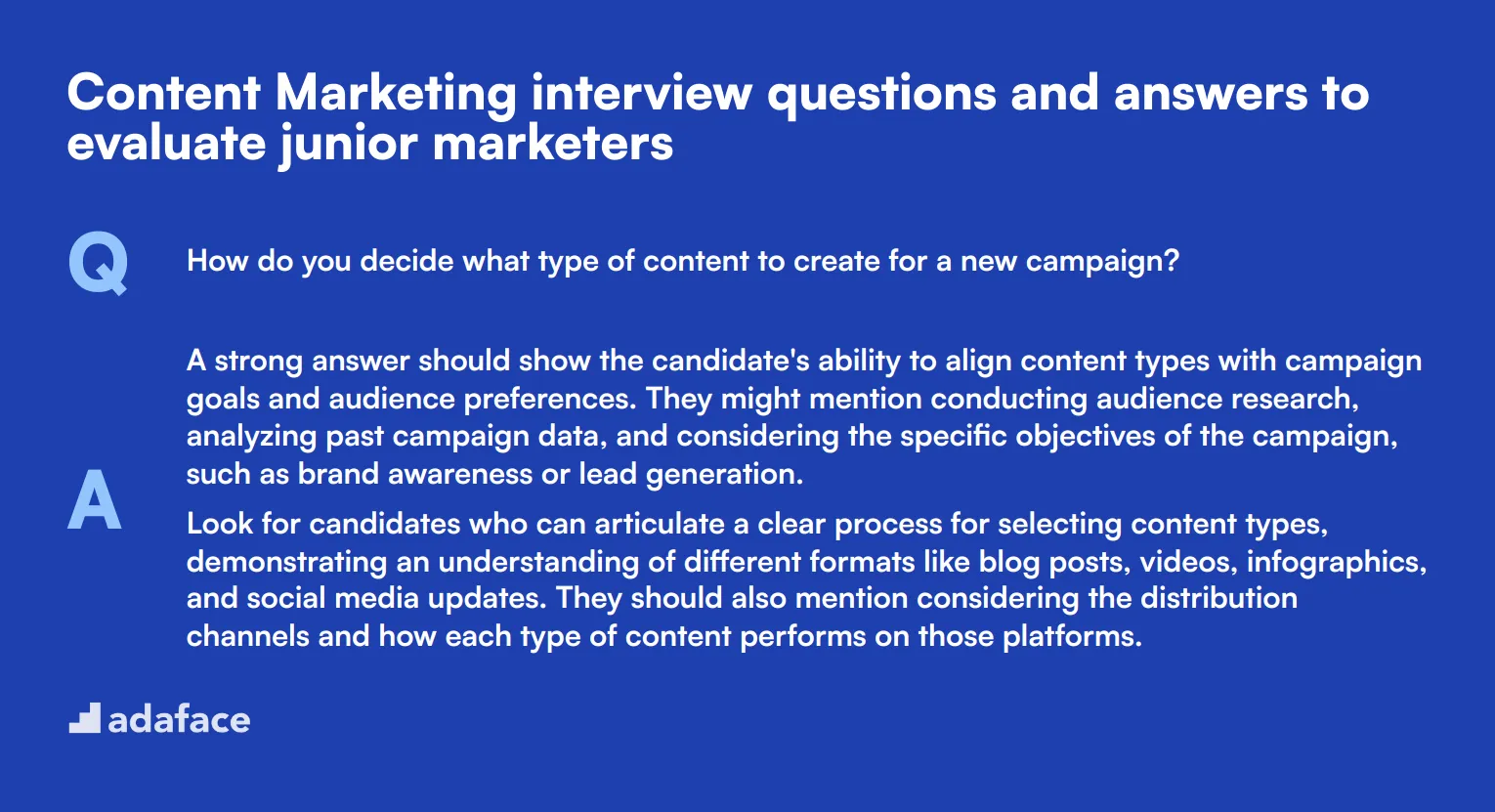
To evaluate junior marketers effectively, use this curated list of content marketing interview questions. These questions focus on essential skills and strategies, helping you identify the best candidates for your team.
1. How do you decide what type of content to create for a new campaign?
A strong answer should show the candidate's ability to align content types with campaign goals and audience preferences. They might mention conducting audience research, analyzing past campaign data, and considering the specific objectives of the campaign, such as brand awareness or lead generation.
Look for candidates who can articulate a clear process for selecting content types, demonstrating an understanding of different formats like blog posts, videos, infographics, and social media updates. They should also mention considering the distribution channels and how each type of content performs on those platforms.
2. Can you walk me through your content creation process, from ideation to publication?
Ideal candidates will describe a structured process that starts with brainstorming and ideation, perhaps in collaboration with their team. They might mention using tools like content calendars, editorial meetings, and audience feedback to generate ideas.
The next steps should include drafting, editing, and incorporating feedback before finalizing the content. Candidates should also highlight the importance of SEO optimization, visual design elements, and scheduling content for publication.
Look for a methodical approach and attention to detail, ensuring each piece of content is high-quality and aligns with the overall marketing strategy.
3. How do you ensure your content is engaging and relevant to your target audience?
To create engaging content, candidates should mention the importance of understanding their target audience's needs, interests, and pain points. They might discuss using audience personas, conducting surveys, or analyzing social media insights to gather this information.
Additionally, they should emphasize creating valuable and relevant content that addresses these needs, using storytelling techniques, compelling headlines, and visuals to capture the audience's attention.
Look for candidates who can demonstrate a deep understanding of their audience and provide examples of how they have successfully engaged their target market in previous roles.
4. What strategies do you use to keep your content fresh and avoid it becoming stale?
Candidates should talk about regularly updating content to keep it current, as well as experimenting with new formats and trends. They might mention keeping an eye on industry news, collaborating with influencers, or repurposing content in different formats to reach new audiences.
Another strategy could include soliciting feedback from the audience and using analytics to understand what content resonates and what doesn't, allowing them to pivot as needed.
Strong answers will show a proactive approach to content innovation, ensuring that the content remains engaging and valuable over time.
5. How do you balance creativity with SEO requirements in your content?
Balancing creativity with SEO is crucial for effective content marketing. Candidates should mention integrating SEO keywords naturally within the content without sacrificing readability or quality. They might discuss using tools like Google Keyword Planner or SEMrush to find relevant keywords.
Additionally, they should emphasize the importance of creating compelling and original content that attracts and retains readers, while also following best practices for on-page SEO, such as using meta tags, optimizing images, and ensuring fast page load speeds.
Look for candidates who can demonstrate an understanding of both creative writing and technical SEO aspects, ensuring the content performs well both for readers and search engines.
6. What methods do you use to distribute content and maximize its reach?
Effective content distribution involves a multi-channel approach. Candidates should mention using social media platforms, email newsletters, and collaborating with influencers or partners to extend their content's reach. They might also discuss paid promotions, such as sponsored posts or PPC campaigns, to boost visibility.
Additionally, they should highlight the importance of understanding the audience's preferred channels and tailoring the content accordingly, ensuring it resonates with each unique platform.
Strong responses will showcase a strategic approach to content distribution, leveraging data and analytics to maximize reach and engagement.
7. How do you handle content that doesn't perform as expected?
When content underperforms, candidates should mention conducting a thorough analysis to understand why. They might discuss looking at metrics such as click-through rates, engagement rates, and time spent on page to identify any patterns or issues.
Based on these insights, they should consider revising the content, changing the distribution strategy, or experimenting with different formats or headlines. It's important to show a willingness to iterate and improve rather than dismissing the content altogether.
Look for candidates who demonstrate critical thinking and problem-solving skills, showing an ability to learn from failures and make necessary adjustments.
8. How do you stay organized and manage multiple content projects simultaneously?
Candidates should describe their time management and organizational skills, mentioning tools like content calendars, project management software (e.g., Trello, Asana), and setting clear deadlines. They might also discuss prioritizing tasks based on urgency and importance, and delegating responsibilities when working in a team.
Effective communication and regular check-ins with team members are also crucial to ensure everyone is on the same page and projects stay on track.
Look for candidates who can demonstrate a structured approach to managing multiple projects, ensuring timely delivery without compromising on quality.
12 Content Marketing questions related to strategies and tactics
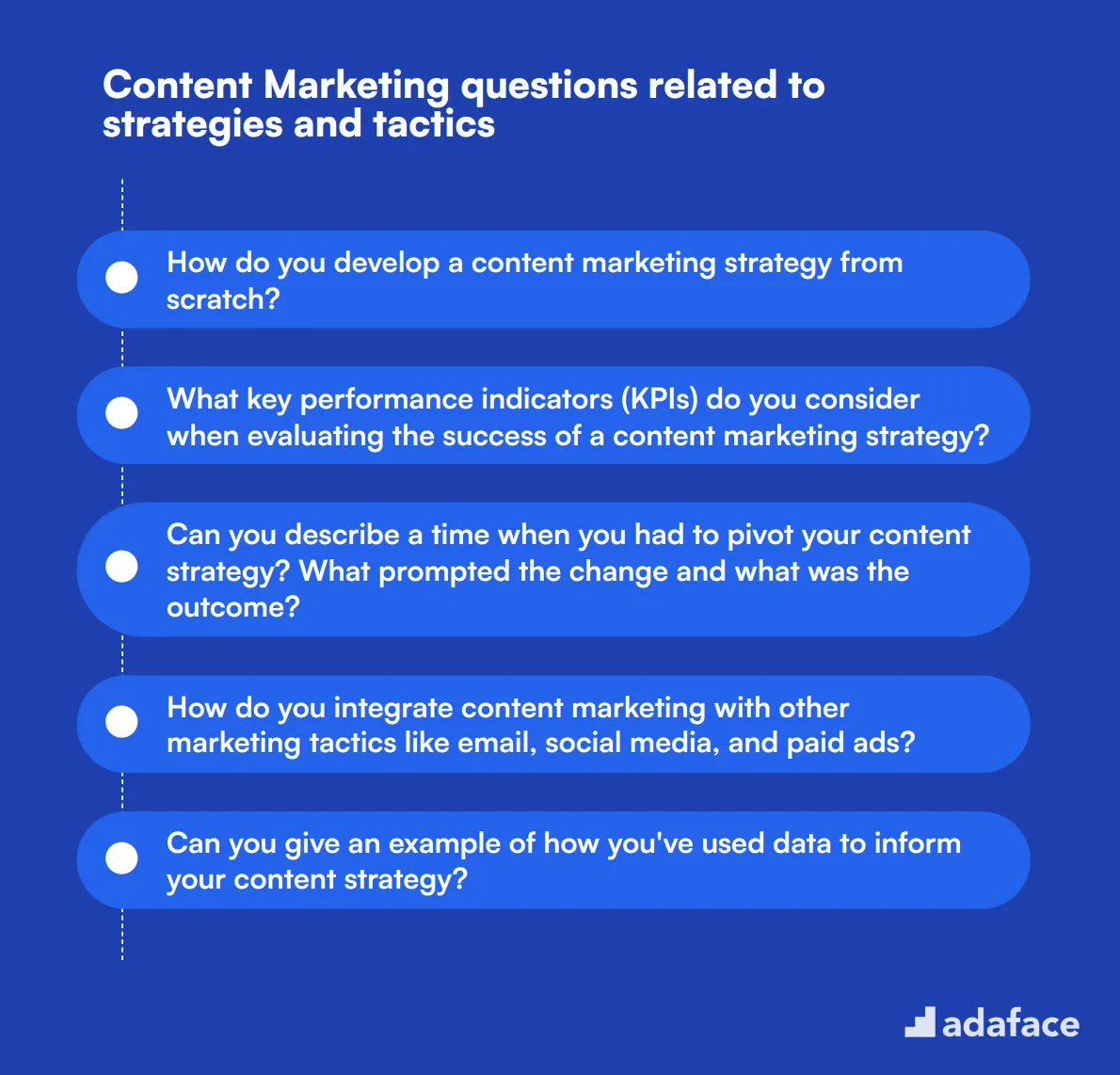
To gauge whether your candidates have the strategic and tactical skills necessary for content marketing roles, consider using these questions. They are designed to assess the depth of understanding and practical know-how required for roles like content strategist.
- How do you develop a content marketing strategy from scratch?
- What key performance indicators (KPIs) do you consider when evaluating the success of a content marketing strategy?
- Can you describe a time when you had to pivot your content strategy? What prompted the change and what was the outcome?
- How do you integrate content marketing with other marketing tactics like email, social media, and paid ads?
- Can you give an example of how you've used data to inform your content strategy?
- How do you prioritize content topics and formats within a strategy?
- Describe a situation where you had to align content marketing goals with broader business objectives. How did you achieve this alignment?
- What steps do you take to ensure your content strategy is scalable?
- How do you handle content repurposing within your content marketing strategy?
- How do you manage and optimize a content calendar for a long-term marketing campaign?
- What are some common mistakes you see in content marketing strategies, and how do you avoid them?
- How do you approach competitor analysis in the context of content strategy?
8 Content Marketing interview questions and answers related to content creation processes
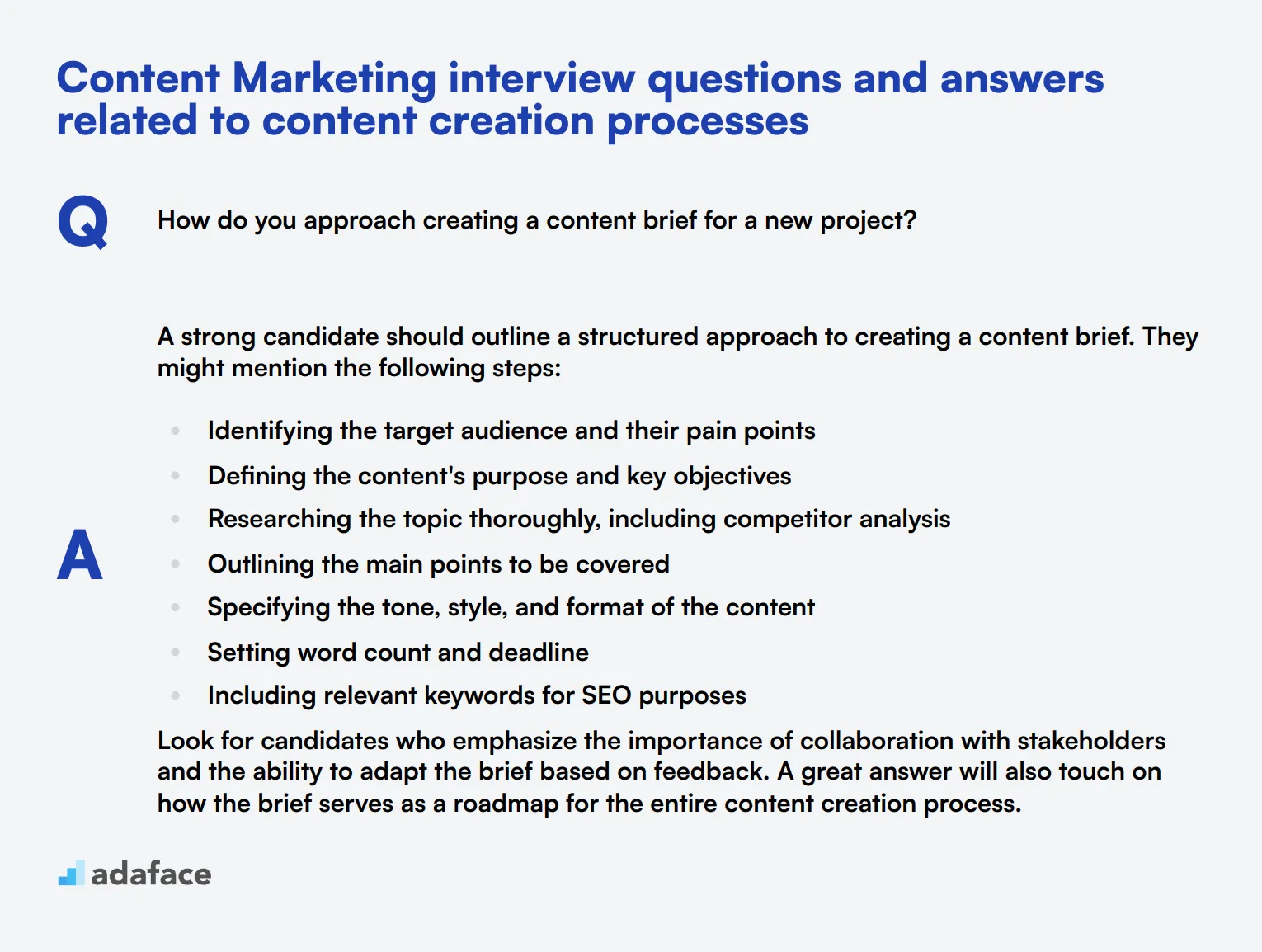
Ready to dive into the nitty-gritty of content creation processes? These 8 questions will help you gauge a candidate's ability to turn ideas into engaging content. Use them to uncover how potential hires approach the content creation journey, from brainstorming to publication.
1. How do you approach creating a content brief for a new project?
A strong candidate should outline a structured approach to creating a content brief. They might mention the following steps:
- Identifying the target audience and their pain points
- Defining the content's purpose and key objectives
- Researching the topic thoroughly, including competitor analysis
- Outlining the main points to be covered
- Specifying the tone, style, and format of the content
- Setting word count and deadline
- Including relevant keywords for SEO purposes
Look for candidates who emphasize the importance of collaboration with stakeholders and the ability to adapt the brief based on feedback. A great answer will also touch on how the brief serves as a roadmap for the entire content creation process.
2. Describe your process for ensuring content aligns with brand voice and style guidelines.
An ideal response should demonstrate the candidate's attention to detail and understanding of brand consistency. They might describe a process like this:
- Thoroughly studying the brand's style guide and voice documentation
- Creating a checklist of key brand elements to reference during writing
- Using tools like Grammarly or Hemingway App to maintain consistent tone
- Regularly reviewing past content to internalize the brand voice
- Collaborating with team members for feedback and consistency checks
- Developing a personal 'cheat sheet' of brand-specific phrases or terms
Look for candidates who emphasize the importance of consistency across all content pieces and platforms. They should also mention the value of seeking feedback and being open to iterations to perfect the brand alignment.
3. How do you incorporate SEO best practices into your content creation process?
A strong answer should demonstrate the candidate's understanding of SEO and its integration into content creation. They might mention:
- Conducting keyword research using tools like Google Keyword Planner or SEMrush
- Naturally incorporating target keywords into headlines, subheadings, and body text
- Optimizing meta descriptions and title tags
- Creating SEO-friendly URLs
- Using internal and external linking strategies
- Ensuring content is structured with proper heading tags (H1, H2, etc.)
- Optimizing images with alt text and descriptive file names
Look for candidates who emphasize the balance between SEO optimization and creating valuable, reader-friendly content. They should understand that while SEO is important, the primary focus should be on delivering high-quality, engaging content for the audience.
4. How do you handle writer's block or creative slumps during the content creation process?
A good answer should show that the candidate has strategies to overcome creative challenges. They might mention techniques such as:
- Taking a break and returning to the task with a fresh perspective
- Changing the work environment or going for a walk to stimulate creativity
- Using brainstorming techniques like mind mapping or freewriting
- Reading related content or industry news for inspiration
- Collaborating with team members or conducting informal interviews for new ideas
- Breaking the content into smaller, manageable sections
- Starting with an outline or rough draft to overcome the initial hurdle
Look for candidates who demonstrate resilience and problem-solving skills. The best answers will show that they view writer's block as a normal part of the creative process and have a toolkit of strategies to work through it effectively.
5. How do you ensure your content is accessible and inclusive to a diverse audience?
An ideal response should demonstrate the candidate's awareness of accessibility and inclusivity in content creation. They might mention strategies such as:
- Using plain language and avoiding jargon or complex terminology
- Providing alt text for images and captions for videos
- Ensuring proper color contrast for readability
- Using inclusive language and avoiding stereotypes or biases
- Considering different cultural contexts and perspectives
- Structuring content with clear headings and bullet points for easy scanning
- Avoiding idioms or colloquialisms that may not translate well globally
Look for candidates who show a genuine commitment to creating content that reaches and respects all audience members. They should understand that accessibility and inclusivity are ongoing learning processes and be open to feedback and continuous improvement in this area.
6. How do you approach creating content for different stages of the buyer's journey?
A strong answer should demonstrate the candidate's understanding of the buyer's journey and how content needs vary at each stage. They might outline an approach like this:
- Awareness stage: Creating educational content that addresses pain points and introduces solutions (e.g., blog posts, infographics)
- Consideration stage: Developing more in-depth content that showcases the product or service benefits (e.g., case studies, comparison guides)
- Decision stage: Crafting content that nudges towards a purchase decision (e.g., product demos, customer testimonials)
- Post-purchase stage: Creating content that supports customer success and encourages loyalty (e.g., tutorials, newsletters)
Look for candidates who emphasize the importance of tailoring content tone, depth, and format to match the audience's needs at each stage. They should also mention the value of creating a cohesive content strategy that guides potential customers through the entire journey.
7. How do you collaborate with other teams (like design or product) during the content creation process?
An effective answer should highlight the candidate's teamwork and communication skills. They might describe a collaborative process that includes:
- Regular check-ins or stand-up meetings with cross-functional teams
- Using project management tools like Trello or Asana for task tracking
- Sharing content briefs and outlines early in the process for feedback
- Collaborating on visual content creation with designers
- Seeking input from product teams to ensure technical accuracy
- Participating in brainstorming sessions with various departments
- Being open to feedback and willing to make revisions based on team input
Look for candidates who understand the value of diverse perspectives in creating comprehensive, high-quality content. They should demonstrate flexibility, strong communication skills, and an appreciation for the expertise of other team members.
8. How do you approach repurposing content for different formats or platforms?
A good answer should show the candidate's ability to maximize content value and adapt to different formats. They might describe a process like:
- Identifying core themes or messages from existing content
- Analyzing which platforms or formats best suit the content and target audience
- Breaking down long-form content into smaller pieces (e.g., turning a whitepaper into a series of blog posts)
- Adapting written content into visual formats (e.g., creating infographics from statistics)
- Turning blog posts into script outlines for videos or podcasts
- Adjusting tone and style to fit different platform requirements (e.g., more casual for social media)
- Ensuring consistency of message across all repurposed content
Look for candidates who demonstrate creativity and efficiency in their approach to content repurposing. They should understand the importance of maintaining content quality while adapting to different formats and audience preferences across platforms.
7 situational Content Marketing interview questions with answers for hiring top marketers
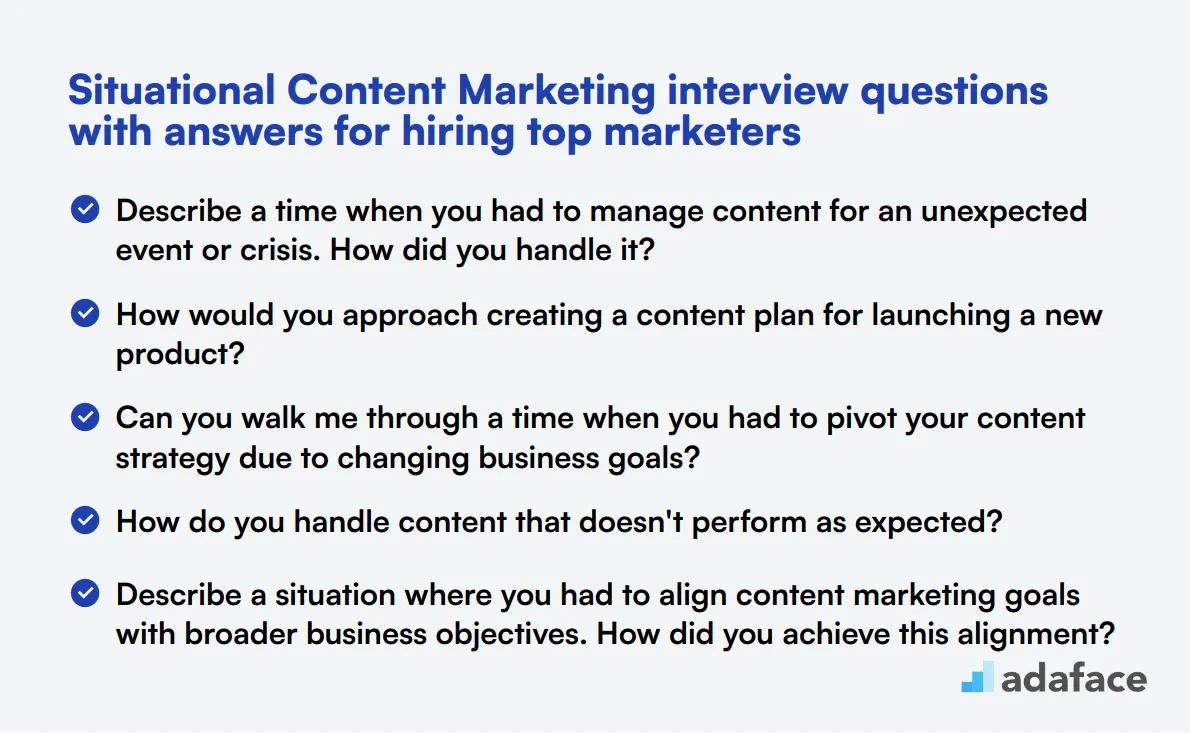
To help you identify top-tier content marketers, we've compiled a list of situational interview questions that delve into their practical experiences and problem-solving skills. Use these questions to assess how candidates handle real-world scenarios and align their strategies with your business goals.
1. Describe a time when you had to manage content for an unexpected event or crisis. How did you handle it?
Candidates should describe a specific instance where they had to quickly adapt their content strategy due to an unforeseen event or crisis. They should explain the steps they took to manage the situation, such as adjusting the content calendar, creating new content, or repurposing existing content.
Look for candidates who demonstrate strong problem-solving skills, flexibility, and the ability to remain calm under pressure. They should also mention how they communicated with their team and stakeholders during the crisis.
2. How would you approach creating a content plan for launching a new product?
A well-rounded answer should include researching the target audience, developing a content calendar, and creating various content types like blog posts, social media updates, and email newsletters. The candidate should also discuss how they would align the content with the overall marketing strategy and business objectives.
An ideal candidate should highlight their ability to integrate SEO best practices and utilize analytics to measure the effectiveness of their content. Look for candidates who emphasize collaboration with other teams such as design and product.
3. Can you walk me through a time when you had to pivot your content strategy due to changing business goals?
Candidates should provide a detailed example of a time when they had to adjust their content strategy to align with new business objectives. They should explain what prompted the change, the steps they took to pivot, and the outcome of their efforts.
Look for candidates who are adaptable and strategic thinkers. They should demonstrate their ability to analyze new goals, quickly develop a revised strategy, and effectively communicate changes to their team.
4. How do you handle content that doesn't perform as expected?
Candidates should discuss their approach to analyzing underperforming content, including reviewing metrics like page views, engagement rates, and conversion rates. They should talk about their process for identifying what went wrong and how they would adjust the content or strategy to improve performance.
An ideal candidate should emphasize their data-driven approach and ability to learn from failures. Look for responses that show a proactive mindset and a commitment to continuous improvement.
5. Describe a situation where you had to align content marketing goals with broader business objectives. How did you achieve this alignment?
Candidates should provide an example of a situation where they successfully aligned their content marketing strategy with the overall business goals. They should explain how they identified the business objectives, developed content that supported these goals, and measured the success of their efforts.
Look for candidates who demonstrate a clear understanding of how content marketing fits into the larger business picture. They should highlight their ability to collaborate with other departments and use data to drive their strategy.
6. How do you ensure your content is accessible and inclusive to a diverse audience?
Candidates should discuss their approach to creating content that is accessible to people with disabilities and inclusive of diverse perspectives. This might include using plain language, adding alt text for images, and considering cultural sensitivities in their content.
An ideal candidate should demonstrate a strong commitment to accessibility and inclusivity. Look for responses that show they are proactive in seeking feedback from diverse audiences and continuously improving their content to meet these standards.
7. How do you approach repurposing content for different formats or platforms?
Candidates should explain their process for identifying which content pieces are suitable for repurposing and how they adapt the content for different formats or platforms. This might include turning a blog post into a video, an infographic, or a series of social media posts.
Look for candidates who show creativity and strategic thinking. They should demonstrate an understanding of the unique requirements of different platforms and how to maintain a consistent brand voice across formats.
Which Content Marketing skills should you evaluate during the interview phase?
While it's challenging to fully gauge a candidate's abilities in a single interview, focusing on key content marketing skills can offer a significant insight into their potential. Below, we explore essential skills that you should evaluate to ensure candidates are well-equipped to meet your content marketing needs.
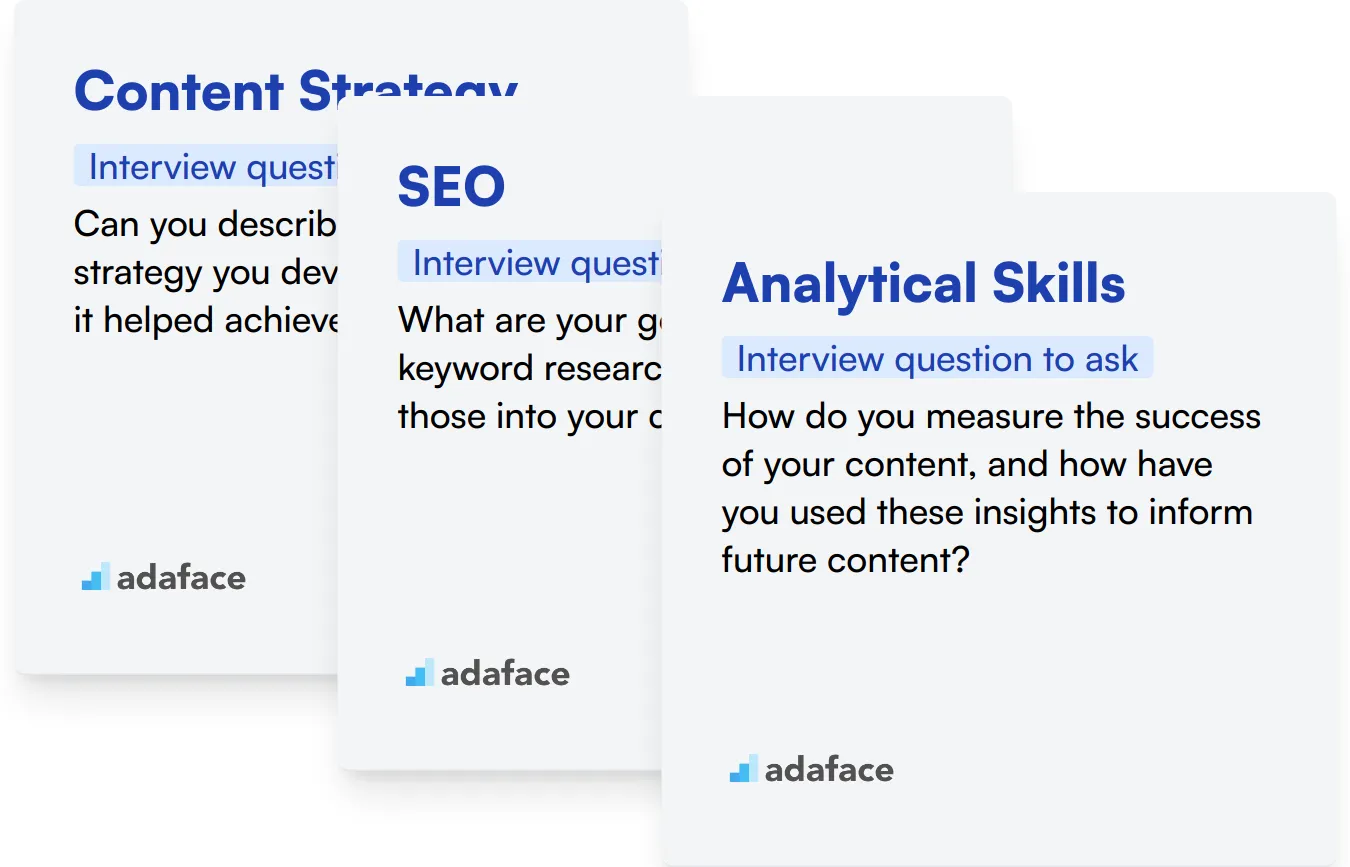
Content Strategy
Content strategy is the backbone of content marketing, involving the planning, development, and management of content. A solid strategy ensures content aligns with business goals and effectively engages the target audience.
To preliminarily assess a candidate's grasp of content strategy, consider utilizing a content strategy test. This test can help filter candidates by evaluating their ability to develop strategic content plans that resonate with business objectives.
During the interview, delve into specific aspects of their content strategy experience with targeted questions.
Can you describe a content strategy you developed and how it helped achieve business goals?
Look for detailed explanations that link strategy to measurable outcomes, showing their ability to think strategically and achieve business objectives.
SEO
SEO is critical for ensuring content is discoverable via search engines and reaches the intended audience. Knowledge of SEO best practices can greatly boost content visibility and effectiveness.
Assessing SEO skills through SEO assessment tests can provide insights into a candidate's ability to optimize content to meet search engine criteria.
In the interview, ask specific questions that reveal their practical SEO knowledge.
What are your go-to strategies for keyword research and integrating those into your content?
Evaluate the candidate's understanding of keyword significance and their methodology in weaving keywords seamlessly into content without compromising quality.
Analytical Skills
Analytical skills are essential for measuring the effectiveness of content marketing efforts and using data to guide strategy adjustments.
To gauge their analytical prowess, you can ask them how they use data in their content marketing decisions.
How do you measure the success of your content, and how have you used these insights to inform future content?
Effective answers should include specific metrics used, such as engagement rates or conversion metrics, and examples of how data influenced content adjustments.
3 Tips for Effectively Using Content Marketing Interview Questions
Before you start implementing what you've learned, consider these essential tips to enhance your interview process and candidate evaluation.
1. Incorporate Skill Assessments Before Interviews
Using skill tests before interviews helps you identify candidates who truly possess the expertise needed for the role. For Content Marketing, tests such as the Content Strategy Test or SEO Assessment Test can provide clarity on a candidate's capabilities.
By implementing these tests early in the hiring process, you can filter candidates based on their actual skills rather than just their resumes. This ensures a more targeted and effective interview, allowing you to focus on candidates who are most likely to succeed in the role. Now, let's move on to the next strategy.
Additionally, skill tests help you evaluate specific competencies relevant to Content Marketing, such as analytics, SEO understanding, and campaign strategy. This structured approach streamlines your interview process, enabling you to ask more insightful questions during the interview.
2. Outline and Prioritize Interview Questions
Given the limited time available during interviews, it's important to carefully choose the right number and type of questions. This not only maximizes your ability to evaluate candidates but also allows you to focus on the key skills and attributes necessary for success in the role.
Consider utilizing other relevant interview questions that assess soft skills such as communication, teamwork, or adaptability. You can refer to our lists of Digital Marketing Interview Questions and SEO Interview Questions for inspiration. Picking quality over quantity will enhance your evaluation process.
Remember, asking just a few well-crafted questions can yield better insights into a candidate's fit for your organization. Prioritize those that uncover the essential skills and experiences relevant to the role.
3. Ask Follow-Up Questions for Depth
Simply asking interview questions won’t always provide the comprehensive insights you need. Follow-up questions are critical to gauge the depth of a candidate's knowledge and to clarify any vague responses.
For example, if a candidate mentions they successfully executed a content strategy, you might ask: 'What metrics did you use to measure its success?' This follow-up question allows you to assess their understanding of analytics and the importance of data-driven decision-making.
Use Content Marketing interview questions and skills tests to hire talented marketers
If you are looking to hire someone with content marketing skills, it's important to ensure they possess the necessary abilities. The best way to do this is by using skill tests. Consider using our Content Strategy Test or Digital Marketing Test.
Once you have used these tests, you can shortlist the best applicants and invite them for interviews. To get started, you can sign up here or explore more on our online assessment platform.
Content Strategy Test
Download Content Marketing interview questions template in multiple formats
Content Marketing Interview Questions FAQs
Look for skills in writing, SEO, analytics, strategy development, social media management, and audience engagement.
Ask about their research methods, content planning, writing techniques, editing process, and how they measure content success.
Present scenarios like handling a content crisis, adapting to algorithm changes, or creating content for a new target audience.
Ask about their experience with content calendars, SEO tactics, distribution channels, and measuring ROI of content campaigns.

40 min skill tests.
No trick questions.
Accurate shortlisting.
We make it easy for you to find the best candidates in your pipeline with a 40 min skills test.
Try for freeRelated posts
Free resources




